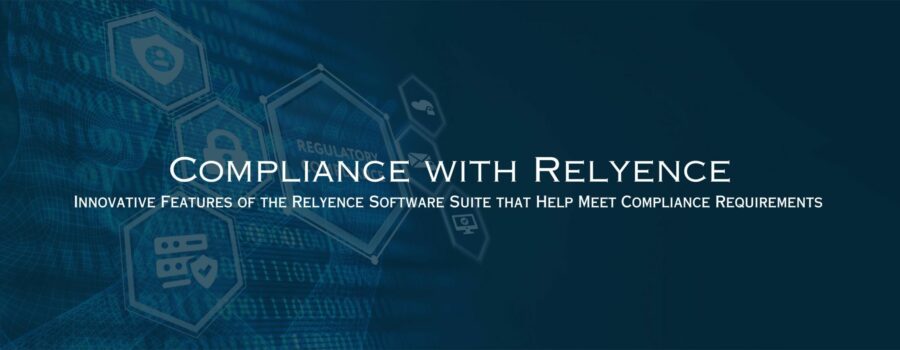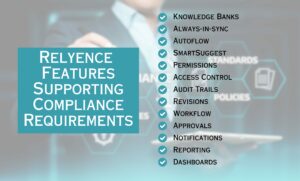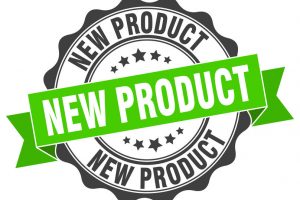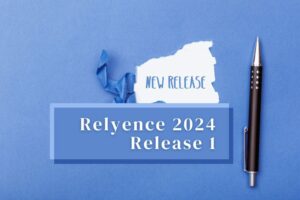This article is an excerpt from our “Compliance with Relyence: Innovative Features of the Relyence Software Suite that Help Meet Compliance Requirements” white paper.
Managing Compliance Requirements
For various industries across the spectrum, compliance requirements are a factor in daily life. Compliance requirements may be external, such as those defined by regulatory agencies. They may also be internal, based on policies implemented to minimize and mitigate risk to your business. Whether externally or internally driven, compliance regulations require an ongoing commitment in order to continually monitor for nonconformities.
Managing compliance requirements can be a burdensome task if not performed efficiently. This is where the Relyence Risk Management and Reliability Analysis software tool suite is advantageous. Through efficient features and functions, the Relyence suite is specifically tailored to assist you in adhering to your compliance requirements in order to make your compliance efforts easier, less error-prone, and more manageable.
Relyence Features Supporting Compliance Needs
In this white paper, we will look at the many ways the Relyence Studio Reliability and Quality Software tool suite helps you meet your compliance requirements. Relyence Studio provides a complete set of analysis tools to evaluate and improve your product and process reliability and quality including FMEA (Failure Mode and Effects Analysis), FRACAS (Failure Reporting, Analysis, and Corrective Action System), Reliability Prediction, Fault Tree Analysis (FTA), RBD (Reliability Block Diagram), RCM (Reliability Centered Maintenance), Maintainability Prediction, Weibull Analysis, and ALT (Accelerated Life Testing).
These tools may be used to perform analyses required for compliance reasons. In these cases, it is important that the features and functionality aid in meeting the critical compliance regulations. Additionally, businesses that prioritize reliability and quality may choose to operate according to compliance standards in order to meet internal performance goals and objectives. In this case, many notable features in Relyence provide efficiency, streamlined data management, consistency, and a host of other benefits for analysts and engineers.
Many of the powerful, innovative, and, in several cases, Relyence-specific features included in Relyence Studio were designed and developed to aid and support compliance needs. The features that aid in meeting your compliance requirements that this paper will explore include:
- Knowledge Banks
- Always-in-sync
- Autoflow
- SmartSuggest
- Permissions
- Access Control
- Audit Trails
- Revisions
- Workflow
- Approvals
- Notifications
- Reporting
- Dashboards
Compliance Standards
Compliance standards vary depending on industry sector and organization needs. For heavily regulated industries, compliance requirements are crucial and must be strictly adhered to. Especially in high-risk industries, compliance requirements play a vital role in ensuring customer safety.
Compliance requirements range broadly, from quality standards to environmental safety standards, to risk management, to manufacturing practices, and more. Therefore, depending upon your sector, you will have your own list of compliance regulations to follow.
Some of the compliance standards that apply across many diverse industry sectors include ISO standards such as ISO 9001 and ISO 31000, GMP (Good Manufacturing Practices), IEC standards, and many more.
Most compliance standards are developed and utilized with the objective of ensuring high levels of product reliability, quality, and safety. This is why reliability software tools play a key role in attaining compliance with these standards.
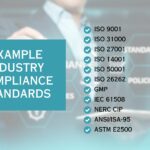
Capabilities Required Across Compliance Standards
As noted, the list of compliance standards that impact manufacturers and service providers is lengthy and diverse. However, there is a great deal of commonality across standards due to the fact that certain elements apply across the spectrum, independent of the focus of a specific standard. While this list is not exhaustive, the following features are often key elements of compliance standards:
- Data Integrity
- Data Security
- Change Management
- Collaboration and Communication
- Documentation and Reporting
Each of these important components are adeptly handled in the Relyence Reliability & Quality Software platform through its many powerful capabilities. In some cases, Relyence has developed an innovative approach to supporting compliance-based needs. Even if your needs are not compliance driven, you will find these Relyence features beneficial for organizational efficiency and quality.
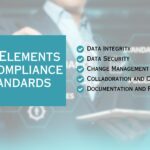
In this paper, each of these key elements will be reviewed along with the specific features in Relyence that support them. It is an in-depth look at all the features Relyence offers to enable you to effectively meet your compliance needs with streamlined efficiency.
Learn More
The “Compliance with Relyence: Innovative Features of the Relyence Software Suite that Help Meet Compliance Requirements” white paper covers the following topics:
- Compliance Standards
- Capabilities Required Across Compliance Standards
- Data Integrity
- Knowledge Banks
- Always-in-sync
- Autoflow
- SmartSuggest
- Data Security
- Permissions
- Access Control
- Change Management
- Audit Trails
- Revisions
- Collaboration and Communication
- Workflow
- Approvals
- Notifications
- Documentation and Reporting
- Reporting
- Dashboards
- Data Integrity
- Relyence Studio: Meeting Compliance Requirements
Download the full white paper here. To learn more about Relyence Studio, feel free to contact us or schedule a personalized demonstration webinar. Or you are welcome to give us a free trial run today!

